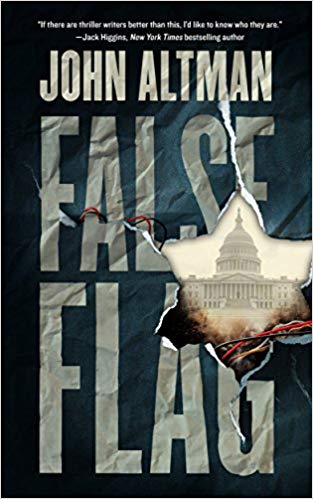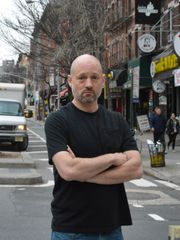The Princeton-based author has sold more than a quarter-million copies worldwide; his latest, False Flag, deals with extremism
Tricia Vanderhoof, @triciavand Published 1:03 p.m. ET April 30, 2017 | Updated 10:42 a.m. ET May 2, 2017
Photo: Courtesy of Julia Gang
STORY HIGHLIGHTS
· In his newest 'False Flag,' rogue extremists in Israel decide to launch a horrific attack against the U.S. and pin it on Iran
· Altman proposed and designed his own major at Harvard for which he wrote a novel a year
· To attend as guests at a Bedouin wedding, Altman and his uncle had to pretend they were not Jewish
Casus belli is a Latin expression cited by one nation as "just cause" to engage in conflict with another. The phrase is invoked to justify war based on offenses or threats directly posed.
Author John Altman excels at endowing even unsympathetic characters with relatable backstories, especially those with loyalties and ideologies anathema to us in the West. His latest thriller, out May 16 from Blackstone Publishing, has the twist right in the title. The premise: rogue extremists in Israel decide to launch a horrific attack against the U.S. and pin it on Iran to provoke American retaliation, and strengthen America’s resolve against Israel’s enemies — thus "False Flag."
Altman’s taut espionage fiction has sold more than a quarter-million copies worldwide in the U.S, U.K., Italy, Japan, Poland, and the Netherlands. He is a member of International Thriller Writers, Mystery Writers of America, and International Association of Crime Writers.
Born in White Plains and a 1992 Harvard graduate, he and his wife live in Princeton with their two children.
READ: Our Mondays with Authors series
THINGS TO DO: Make the most of living in Central Jersey
TRAVELING AROUND CENTRAL JERSEY: Columnist Jenna Intersimone has great places to go
TV: Your six previous novels span World War II to the present day. What brought you to 'False Flag?'
JA: 'False Flag' might be my seventh published but I have 13 more that weren’t.
I grew up in a Jewish family and Jews like to talk and argue. It’s what Jews do at dinner, especially about Israel.
I was reading about 'The Godfather' and subsequent 1972 movie. (Producer Robert) Evans said he wanted a Mafia film so authentic that audiences could ‘smell the spaghetti.’ They hired Coppola to direct.
I’ve written World War II books and I’ve written about Russia and I wanted to write that kind of book about Israel. (laughs) It’s also a way of saying stuff I would never dare say in front of my family.
Characters and ideology
The protagonist of 'False Flag' is Dalia Artzi, broad-shouldered, too frugal to spring for a salon dye job to hide her silver roots, an almost-but-not-yet septuagenarian. She's pushing 70 and wears tweed suits and purple d’Orsay pumps. She is a long way from her kibbutznik days.
Artzi is a Sabra, part of the first generation born in modern Israel, inculcated with a single overwhelming priority: never again. She is a tactical genius and a brilliant strategic thinker. A visiting professor at Princeton, she lectures on the study of maneuver warfare. She has been a sincere pacifist, although never blindly, devoting her life to the study of war only to better enable herself to prevent it. Until they took Zvi.
John Altman's newest espionage thriller, 'False Flag," explores extremism. (Photo: Courtesy of Blackstone Publishing)
John Altman proposed and designed his own major at Harvard for which he wrote a novel a year. (Photo: Courtesy of Julia Gang)
Her daughter’s children are rapidly approaching Israeli age for military service, and Dalia’s only son was abducted five years ago, rotting in an Arab prison, if he still lives at all. Her sole motivation is Zvi’s possible release, and all factions — Americans, Israelis, Iranians — manipulate that hope, however unlikely, to enlist Dalia for their own ends. To her, the real enemy is not Islam but extremism, whether Muslim, Christian or Jewish.
Jana Dahan, a young Israeli operative working with the fanatics, has been chosen to implement the attack. Damaged herself, she kills and exploits with impunity. Convinced she is on the side of right, she believes that ends will justify means.
TV: Extremism eventually exhibits in almost every main character, even those once committed to avoid it. All the characters are broken in some way, and all are in some way unlikable. Regardless of motivation, it’s a self-defeating trait. No one’s hands are clean.
JA: That’s my point — nobody really wins. I consider myself a moderate who leans left but all (the characters) have been driven by war to an extremist position And it’s as Dalia says: an occupying army is never truly safe.
TV: One assertion in 'False Flag' is that each dead child drives a new generation into the arms of radical fundamentalism. What is the answer then?
JA: I don’t know that there is one. Put money into infrastructure instead of drones? Doing that employs ‘tikkum olam.’ Although that’s not a part of today’s narrative on any side, it’s a fundamental principle of Judaism: you gain real peace not by delivering a crushing deathblow to your enemies; you repair the world through cooperation, moderation, and sympathy for the disadvantaged.
At Harvard and spy technology
TV: Your degree from Harvard — what was your major?
JA: I proposed and designed it myself. The fancy name was ‘Development and Construction of the Novel,’ essentially creative writing with a special concentration. But although it had half the course load of the regular curriculum, my proposal was that I would write a full novel every year. And I did during my sophomore, junior and senior years. They assigned me a mentor, Ted Widmer. He had a junior teaching position, American Satire I think. He went on to be speechwriter for Bill Clinton.
He was great. He majored in Renaissance Lit, wrote for the (Harvard) Lampoon, and played guitar and sang in a satire band called The Upper Crust, Ted was Lord Rockingham. This was in the early 90s. They all dressed as 18th century French noblemen in powdered wigs, velvet pantaloons and lace cravats and played AC/DC and hard-rock. One was ‘I Got My Ascot and My Dickie.’ You can still see them on YouTube.
TV: The surveillance technology you cite is mind-boggling. How much is real?
JA: It’s all real. StingRay was initially developed for military intelligence and now it’s everywhere. It extracts and stores data from the mobile networks and can reverse-trace a call.
TV: And ARGUS-IS? (Autonomous Real-Time Ground Ubiquitous Surveillance Imaging System), the world’s highest-resolution camera at 1.8 billion pixels.
Unlike most airborne systems, the drone can provide either a wide-field view for surveillance or a narrow-field view for targets, with an overview of 36 square miles from 20,000 feet. It has an option to focus on an open window with a resolution of 10 centimeters, enough to identify a human face, and able to store one million terabytes of video per day?
JA: I’m not terribly technical but I have friends who are. It’s all real spooking technology, although there are some limitations — with ARGUS you have to know exactly where to point it. Also, there is just so much real-time information, from and to so many sources, but just a finite number of only-human people.
A traveling man
To attend as guests at a Bedouin wedding, John Altman and his uncle had to pretend they were not Jewish. (Photo: Courtesy of Julia Gang)
TV: Sense of place is vivid in all your books, as much a character as the inhabitants. You've been to every continent, including Antarctica?
JA: I’ve been fortunate to do a lot of traveling with my father. I’ve been the lucky one who gets to go with him when my mom opts out, and to have members of my family invite me on amazing trips.
My Dad and I took a cruise ship from the southernmost point of South America to Antarctica, and then took Zodiacs to visit a bunch of islands. It was fascinating and beautiful. Lots of lots of penguins on those islands! That one was sponsored by the Harvard Alumni organization.
We’ve taken a train from Dar Es Salaam (Tanzania) to Capetown, in Africa. That one was a little scary — I remember passing hulks of rusting trains that had derailed before us. We’ve also traveled by train across Australia, and taken a train from Beijing to Moscow, the original Trans-Siberian express.
I’ve traveled as a tourist, without cool train trips, to Europe and elsewhere and have family in Israel so I’ve been there a few times And I’ve gone on a bunch of road trips, by myself and with friends, all around North America, including Mexico and Canada.
TV: When did you learn Hebrew?
JA: I went to Hebrew school for a year but don’t really speak it. The Internet was my source for a lot of the language.
TV: I love the idiom, ‘Yom asal, yom basal’ — ‘A day of honey, a day of onion.’
JA: That’s actually an Arabic expression. There’s a lot of cross-pollination. My uncle lives in Israel and is an underwater photographer. He was old friends with a Bedouin sheik whose daughter was getting married in the Sinai. My uncle was invited to the wedding and I traveled there with him. It was very exciting, we had to pretend not to be Jewish.
TV: What was the wedding like?
JA: It was in a big tent about an hour away in the desert. After the ceremony, everyone got into Jeeps and drove around shouting and firing automatic weapons into the air.
TV: Were you one of them?
JA: It was a bit terrifying. I was just trying to keep a low profile.
Follow Altman on Facebook @johnaltmanwriter & Twitter @johnaltman1969
Originally Published by USA TODAY
https://www.mycentraljersey.com/story/things-to-do/2017/04/30/mondays-authors-john-altman-espionage-fiction/101005712/



